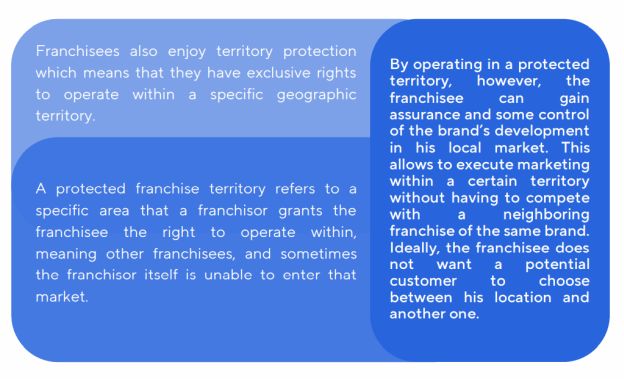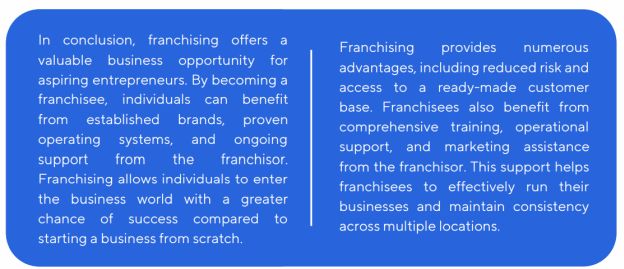Franchisees are allowed to use the franchisor's established brand name, trademarks, and logos to market their products or services. This helps franchisees benefit from the brand's established reputation and attract customers. It also helps to gain the audience trust.A franchise is a legal and commercial relationship between the owner of a trademark, brand, or business model (franchisor) and an individual or group (franchisee) who is granted the right to operate a business using that trademark, brand, or business model.
The concept of franchising dates back to the Middle Ages when English monarchs granted exclusive rights to certain individuals to conduct specific trades or sell certain products.
He allowed independent business owners to sell and service his sewing machines in exchange for a fee and a share of the profits. This model proved to be successful and laid the foundation for future franchise arrangements.
However, modern franchising as we know it today has its roots in the United States, where it first emerged in the early 20th century. One of the first successful franchise models was developed by Isaac Singer, the inventor of the sewing machine, in the 1850s.
In the early 20th century, franchises started to gain popularity in the United States, particularly in the fast-food industry. Ray Kroc's acquisition of the McDonald's concept from the McDonald brothers in 1955 is often considered a landmark event in the history of franchising. Kroc transformed McDonald's into a globally recognized brand by franchising it to entrepreneurs who would open and operate their own McDonald's restaurants.
Since then, franchising has become a widely used business expansion strategy across various industries, including hospitality, retail, automotive, education, healthcare, and more. It offers entrepreneurs the opportunity to operate a proven business model with established brand recognition, marketing support, and ongoing training and support from the franchisor.
Franchising has become a popular business model also in Armenia and has gained traction over the years. In Armenia Franchise is also known as authorization for complex entrepreneurial activity. This model allows a company (the franchisor) to expand its business by granting the right to an independent operator (the franchisee) to use the system of exclusive rights belonging to the former in the entrepreneurial activity in exchange for a fee.
Due to its advantages, nowadays more and more people choose franchising as a comfortable and easy business model. It allows the franchisee to pass on the organizational details and stages such as the invention of brand name, advertisement, gaining reputation and a good name, details which would make the new business unique and successful. However, this business model can have some difficulties, as franchisees are somehow dependent on the franchisor that unable them to make independent decisions regarding changes in the local market.
Franchising has several features that make it an attractive option for entrepreneurs and business owners all around the world. It is an easy model which allows all the parties to receive profit with minimum risks because the mechanism is already tested and checked out by the franchisor who has succeeded in a certain field of business and can share its own experience with the franchisee.
Here are some of the main aspects:
The Use of a Recognized Brand Name:
Franchisees are allowed to use the franchisor's established brand name, trademarks, and logos to market their products or services. This helps franchisees benefit from the brand's established reputation and attract customers. It also helps to gain the audience trust.
Standardized Operating Procedures:
Franchise operating systems and procedures are the standardized methods and processes that franchisees must follow in running their business under the franchisor's brand. These systems and procedures are designed to maintain consistency and ensure that all franchise locations provide the same level of quality and service. Here are some common examples:
Training
Franchisees receive comprehensive training on various aspects of their business operations, including product or service knowledge, sales techniques, customer service, and administrative tasks. This training can be provided through classroom sessions, online modules, on-the-job training, or a combination of these methods.
Operations Manual
Franchisees receive an operations manual that outlines step-by-step instructions for various tasks and procedures. These manual covers everything from opening and closing procedures to inventory management, staff scheduling, cash handling, and equipment maintenance.
Hiring and Staffing
Franchisees may be provided with guidelines on the recruitment, selection, and training of their staff. This includes job descriptions, interview questions, and training materials to ensure that the franchise operates with skilled and knowledgeable employees.
Product/Service Standards
Franchisors set strict standards for product or service quality, including ingredients, preparation methods, presentation, and customer experience. Franchisees must adhere to these standards to maintain uniformity across locations.
Marketing and Advertising
Franchise operating systems often include guidelines for marketing and advertising activities. This can include recommendations for local marketing initiatives, approved marketing materials, and guidelines for using the franchisor's brand and trademarks in advertising campaigns.
Purchasing and Inventory Management
Franchisors may have preferred suppliers and negotiated contracts for purchasing products or raw materials. Franchisees are required to source their supplies from these approved suppliers and follow guidelines on inventory management and control.
Financial Reporting
Franchisees are typically required to provide regular financial reports to the franchisor. These reports may include sales figures, expenses, and other financial information necessary for monitoring the financial health of the franchise location.
Quality Control
Franchisees are subject to periodic inspections and quality control assessments by the franchisor or its representatives. This ensures that franchise locations meet the brand's quality standards and comply with operating procedures.
Communication Channels
Franchise operating systems often include established communication channels between the franchisor and franchisees. This facilitates regular updates, sharing of best practices, and addressing any issues or concerns that arise.
Continuous Improvement
Franchisors may encourage franchisees to provide feedback and suggestions for improving the operating systems and procedures. This helps in identifying areas that need refinement and continuously enhancing the overall franchise operations.
Fee:
The franchisees are required to pay an initial franchise fee to the franchisor and ongoing royalties based on a percentage of their sales. In return, they receive training and ongoing support from the franchisor in areas such as marketing, operations, and management.
The difference between the initial franchise fee and ongoing royalties is that the initial franchise fee is the one-time payment made by a franchisee to the franchisor for joining the franchise system, usually upon signing the franchise contract and the royalty fee is an ongoing fee that is usually paid by a franchisee during the whole length of a franchise contract in return for use of the franchisor's trademark, systems and goodwill.
Territory Protection:

Armenian Law regulates almost every aspect of Franchising, including rights and obligations of the parties, form and registration of a franchise contract, conditions and legal regulation of sub-franchise, payment under the franchise contract, duties, and restrictions of the rights of the parties, etc. According to it, commercial organizations, and individual entrepreneurs can be parties under the franchising contract, and the registration of the contract must be carried out by the authorized state body which registered the right holder as a commercial organization or individual entrepreneur. Only in the situation when the latter's registration was carried out in another country, the contract must be registered in the state body which registered the user's commercial organization or private individual. In Armenia, such an authorized state body is the State Register of Legal Entities.
It is important to refer to the contract registration form, which is the first and most important stage to start the mentioned relations. The only acceptable form of concluding the contract is the written version, the violation of which will lead to its invalidity and the contract will be considered null and void. The contract can be signed for a definite period and indefinite term.
In case the contract or the right holder allows, the user can conclude a complex subfranchise contract, transferring the exclusive rights belonging to the right holder to third parties, but only for the period for which the contract for the main franchise contract was signed. For the sub-franchise contract, the legislator clearly defines that all the provisions related to the complex license contract apply to the Complex Sublicense contract.
The parties to the franchising contract have the right to refer to the contract in their relations with third parties only after it has been registered. The mechanism of registration of the Sublicense contract is the same, as in the case of the main License Contract. It means that the authorized body is also the State Register of Legal Entities.
The complex permission for the use of the object protected by the patent legislation is also subject to registration in the authorized body that is Intellectual Property Office. Failure to comply with this requirement renders the complex permit contract to be null and void.
Conclusion

- However, it is important to note that franchising also involves certain challenges. Franchisees must adhere to the franchisors' operating systems and procedures, restricting their flexibility and creativity to some extent. Plus, franchise contracts often require payment of ongoing fees, which can impact profitability.
- Before entering into a franchise relation, it is crucial for individuals to thoroughly research and evaluate different franchise opportunities. This includes analysing the market potential, financial obligations, and support provided by the franchisor. Seeking legal and financial advice is highly recommended to ensure a clear understanding of the rights, obligations, and risks associated with franchising.
The content of this article is intended to provide a general guide to the subject matter. Specialist advice should be sought about your specific circumstances.


